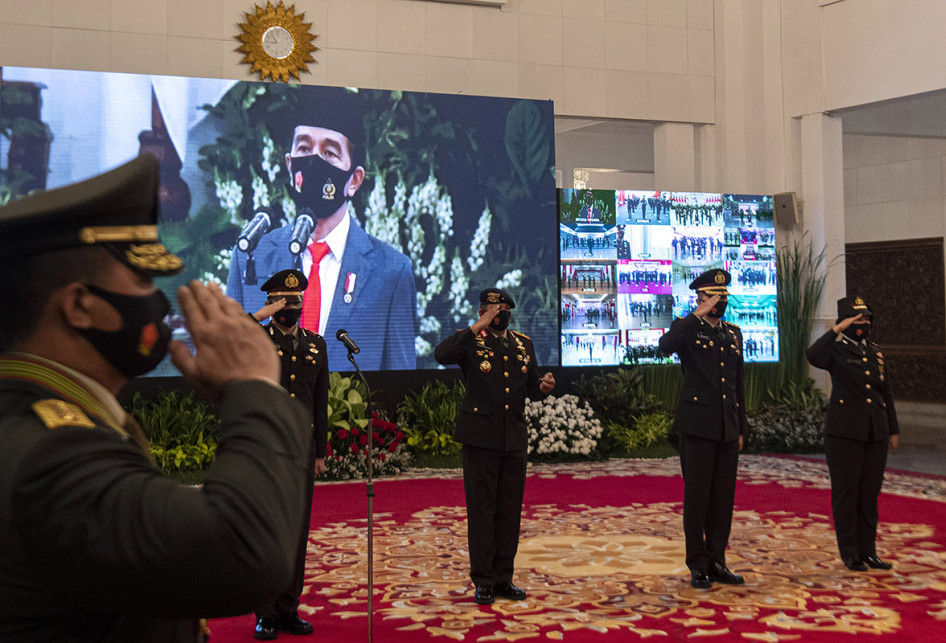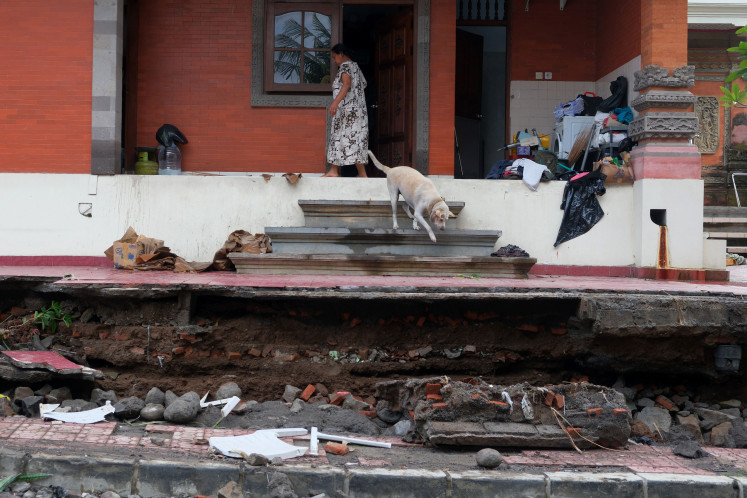Popular Reads
Top Results
Can't find what you're looking for?
View all search resultsPopular Reads
Top Results
Can't find what you're looking for?
View all search resultsBill may give police authority to prevent 'community diseases'
An article in the controversial omnibus bill on job creation that broadens the scope of the National Police's authority has raised concerns among activists and observers who fear the bill will increase the potential for abuses of power.
Change text size
Gift Premium Articles
to Anyone
A
n article in the controversial omnibus bill on job creation that broadens the scope of the National Police's authority has raised concerns among activists and observers who fear the bill will increase the potential for abuses of power.
Article 82 of the omnibus bill grants the police the authority to take action to prevent and contain the spread of so-called “community disease” as well as to monitor the propagation of beliefs that are deemed to undermine the unity of the nation.
The article does not provide a detailed definition of “community disease”, but mentions homelessness, prostitution, gambling, drug abuse, drunkenness, human trafficking, loan sharking and extortion.
The Indonesian Legal Aid Foundation (YLBHI) has spoken out against the bill, expressing concern it would be used as a justification for the violation of human rights and to suppress minority groups.
“A detailed explanation of what is meant be ‘community disease’ is not provided. The bill also does not explain which ‘beliefs’ could potentially threaten the unity of the nation,” YLBHI spokesperson, Siti Rakhma said during a webinar on Sunday.
“I am afraid that any form of mass protest will be considered a ‘community disease’ or as propagating beliefs that could undermine national unity,” she added. “The bill could also pose a threat to the rights of minority groups.”
Ahmadiyah spokesperson and activist, Yendra Budiana, echoed Siti’s concerns, saying that “followers of Ahmadiyah have long been persecuted by the authorities and the police, who claim that Ahmadiyah is a so-called ‘community disease’.”
He cited the persecution faced by Ahmadiyah followers in Depok, West Java, in 2017, when police and the Public Order Agency (Satpol PP) sealed the Al-Hidayah mosque, confiscated the mosque’s CCTV footage and made sure the mosque would not be used by Ahmadiyah followers.
Engkus Ruswana, a representative of the Syncretic Beliefs Council, also questioned the plan to expand the police’s powers, as he argued they had long been a prominent actor in undermining tolerance toward minority groups. “I wish the law was not used as a tool to eradicate us.”
Furthermore, Article 82 also gives the police the authority to issue business licenses in the security service sector. The bill amends Article 15 of Police Law No. 2/2002, which gives the police the authority to only issue operational permits for businesses in the security service sector. In addition, the bill also gives the police a direct role in educating special police units, security task forces and civil servant investigators.
Essentially, Article 82 of the omnibus bill extends the police’s authorities in three main categories: monitoring and public security, business licensing and training and education.
Ombudsman official Ninik Rahayu said the police’s expanded roles would be “too overwhelming” for the police to handle, as it would require additional administrative tasks to be performed.
“The bill indicates that the police will perform all functions, from creating regulations, to monitoring and corrective maintenance [in education],” Ninik said during the discussion. “It will overwhelm the police.”
She added that the increased administrative role of the police in issuing business licenses was redundant, as the government already provided an integrated online single submission (OSS) system for business licensing managed under the Investment Coordinating Board (BKPM).
Former deputy chairman of the Corruption Eradication Commission (KPK) Laode M. Syarif also expressed concerns about the bill, arguing that granting an institution too much authority could lead to abuses of power and corruption.
“By giving an institution more authority, the potential for abuse [of power] increases,” he said. “In addition, the omnibus bill does not provide any safeguards to monitor and keep in check the powers [given to the police].”
“In particular, giving the police an administrative function, which is beyond their capacity, only opens up chances for corruption. The police will not only act as law enforcement, but also as a regulator,” Laode explained.
He called for action to be taken to prevent the omnibus bill on job creation from being passed into law. He argued that the bill was also prone to multiple interpretations, and thus should not be considered as a proper legal product.
“I think the police are already overwhelmed with their job to maintain public order, security and enforce the law. Expanding their roles is dangerous,” he said.










